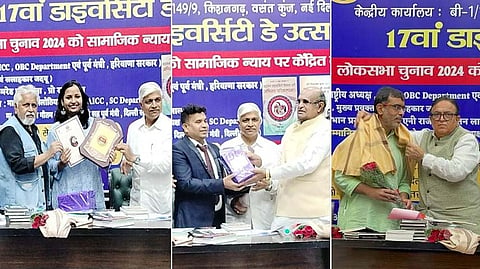
New Delhi— The Bahujan Diversity Mission (BDM) and The Samvidhan Bachao Sangharsh Samiti organized a seminar on 'Diversity Day' at the Constitution Club on Sunday. On this occasion, Meena Kotwal, Founder and Editor-in-Chief of The Mooknayak, was awarded the 'Diversity Woman of the Year', eminent advocate and political-social activist RR Bagy, and Stree-Kaal editor and author Sanjeev Chandan were awarded the 'Diversity Man of the Year'.
August 27 is celebrated as Bahujan Diversity Day. The real purpose of celebrating this day is to address the representation of every section of Bahujan society that is still marginalized due to social systems.
With the representation question in mind, a discussion was held at the Constitution Club in Delhi, focusing on why it is necessary to center the Lok Sabha elections of 2024 around social justice. Social justice can be interpreted from various perspectives, but its true meaning is understood when viewed through the lens of those who have been oppressed for centuries. Many thinkers and leaders of Bahujan Samaj participated in the discussion. Aam Aadmi Party leader Rajendra Pal Gautam, former MP K.C. Tyagi, Congress leader Captain Ajay Singh Yadav, writer H.L. Dusadh, Professor Ratan Lal, Professor Suraj Mandal, and many others attended the program.
Numerous books are released during this annual event, and this year was no exception. Seven books by author and Bahujan thinker H.L. Dusadh were released. Among them was a book written about Congress leader Rahul Gandhi. In his speech, Dusadh emphasized the importance of research and literature for society. He compared literature's role to that of food, nourishing the mind. Dusadh cited the example of America where the Kerner Commission was established in 1967 to address increasing incidents of riots. The commission's report, released ten months later, emphasized the necessity of peace for national development. This led to diversity policies resembling reservation in the United States, promoting preferential treatment for non-white individuals in government jobs, trade, and business.
The situation in India was not significantly different. A significant portion of the population was intentionally kept underprivileged, wasting their human potential. August 27, 2002, marked the introduction of the idea of diversity in supply at the Bhopal Conference. This move aimed to empower marginalized communities, with the vision that the first Dalit millionaire would emerge from Madhya Pradesh. However, Dusadh noted a flaw in the persistence of his community—frequently giving up the fight before success.
Continuing, Professor Ratan Lal stated that merely aspiring to be rulers is insufficient; true leadership requires multiple qualities. He stressed the need to reach various power centers and highlighted the shortcomings of exclusively pursuing government jobs. Professor Lal advocated for broader representation across sectors, similar to the prevalence of upper-caste individuals. He questioned why the focus was limited to government jobs and leadership roles, urging consideration of entrepreneurship, software engineering, arts, and writing.
Discussing politics, JD(U) spokesperson and former Rajya Sabha MP KC Tyagi asked why social justice hadn't taken the center stage in politics. He lamented that even after 76 years of independence, one-third of the nation still witnessed Dalit individuals engaging in manual scavenging, highlighting the ongoing inequalities. He shared that the issue of caste census would be prominent in the India Alliance's manifesto, a coalition of which his party is part. KC Tyagi advocated for extending reservation policies to the private sector.
Rajendra Pal Gautam, leader of the Aam Aadmi Party, also part of the opposition's India Alliance, expressed his dedication to fighting for social justice regardless of who becomes the next Prime Minister. He emphasized standing by the principles of Dr. Babasaheb Bhimrao Ambedkar and fighting for the rights of their community. Gautam stressed his commitment to his community above party affiliations.
The event also included numerous honorees, including Meena Kotwal, the founder of The Mooknayak. The organization has been working relentlessly for the marginalised sections of the society and aims to amplify the voices of oppressed people and question the government about persisting inequalities. The seminar was attended by Arun Kumar, Nitisha Khalko, Rajan Agarwal, Rajababu Agnihotri, and other dignitaries.
Also read-
You can also join our WhatsApp group to get premium and selected news of The Mooknayak on WhatsApp. Click here to join the WhatsApp group.